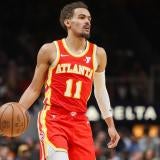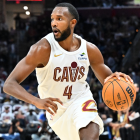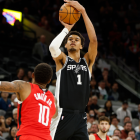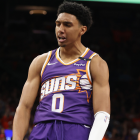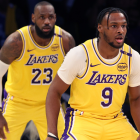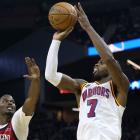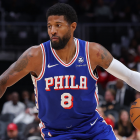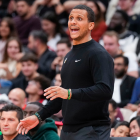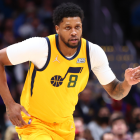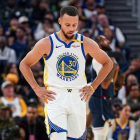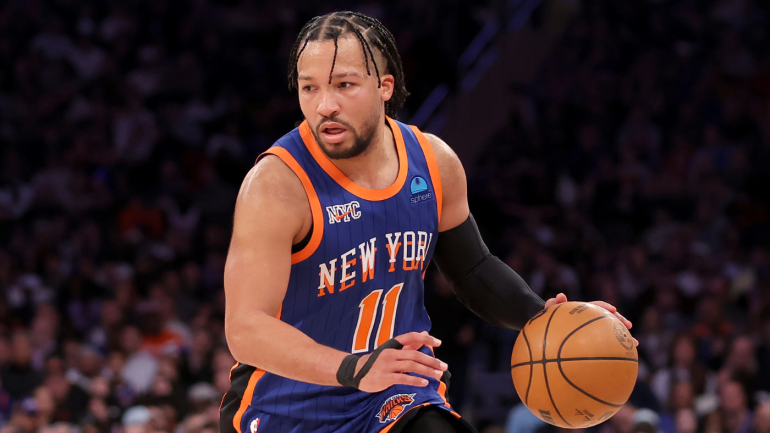
Three years ago, Jalen Brunson had the playoff series of his nightmares. Brunson, then the Dallas Mavericks' sixth man, scored just 18 points on 7-for-22 shooting in the last four games of the first round against the Los Angeles Clippers. He was minus-56 in 114 total minutes in the series, and logged only 10 minutes in Game 7, a 15-point Clippers win in which Brunson scored two points and watched Trey Burke play over him.
Brunson's struggles can be attributed, at least in part, to the defense of then-Clippers forward Nicolas Batum, a versatile veteran who rarely makes mistakes, stands 6-foot-8 and has a 7-foot-1 wingspan.
"Batum completely shut down Jalen Brunson last year in the playoffs, like completely shut him down," then-Mavericks director of quantitative research and development Haralabos Voulgaris said on Bill Simmons' podcast in 2022 "Now that was something that was devastating to the Mavs' ability to win games. You just basically take away your second-best offensive player because Batum's on him. That's tough to deal with."
On Saturday at Madison Square Garden, Brunson and Batum will meet in the first round again, and they're both riding high. Brunson, the New York Knicks' leading man, just finished the best regular season of his career, one that will earn him his first All-NBA nod and a place on many MVP ballots. Batum, the Philadelphia 76ers' jack-of-all-trades, just became a postseason hero by making six 3s and blocking Miami Heat guard Tyler Herro's crunch-time 3 in the play-in.
Batum will likely spend some time guarding Brunson, but it isn't 2021 anymore. That was Brunson's first playoff series, and while he was indeed Dallas' second-best playmaker -- and one of the league's best backups -- this was a full year before he exploded for 41 points with Luka Doncic sidelined against the Utah Jazz. In a couple of ways, his struggles against the Clippers directly led to him becoming the superstar he is now: Dallas decided not to offer him the four-year, $55 million contract he was eligible for the following summer, and Brunson didn't want to experience a series like that ever again.
"It sat with me all summer," Brunson told reporters at training camp the next season. A little less than a year ago, during his first playoff series with the Knicks, he told Fox Sports' Yaron Weitzman, "I wouldn't really trade any experience for anything. Knowing how I played that series and knowing what I could have done, what could have been better, that kind of was always on my mind. And it still is."
Brunson has made a case for Most Improved Player in each of the three seasons since. He is a radically different, more confident player than the one who looked hesitant against Batum, and he's in a totally different team context. He's still 6-foot-2, but he and the Knicks are used to opposing teams putting bigger, longer defenders on him. Brunson is aggressive against them, physical with them and usually able to get where he wants to go.
Long renowned for his footwork, Brunson has proven this year that he's one of the toughest covers in the NBA. He's insanely crafty, but all the focus on his pivots and pump fakes might have overshadowed his ballhandling, first step and pure bucket-getting. This season, he upped his usage rate from 26.6% to 31.1% (sixth in the league among qualified players) and his efficiency barely budged.
Compared to his Dallas days, he's way better at drawing fouls, somehow even better at taking care of the ball and a totally different kind of threat as a shooter. As well as making 44.5% of his catch-and-shoot 3s this season, the only two players who attempted more than his 4.3 pull-up 3s per and shot a better than his 37.4% on them were Doncic and James Harden. (On a per-possession basis, he shot pull-up 3s almost four times as frequently as he did in 2020-21.)
Recently, Brunson has diversified his game out of necessity. After fellow All-Star Julius Randle suffered what turned out to be a season-ending injury in January, opponents started defending Brunson more aggressively. New York countered this by getting him off the ball, where he is excellent at relocating for 3s and using opponents' ball-denial against them.
The Sixers could choose to blitz him, but he's seen that coverage more than anyone except Doncic (and he's seen lots of switch-and-double, too). He'll either get rid of the ball quickly, or he'll drag out the double team and further compromise the defense; either way, the Knicks will end up with a 4-on-3.
While Batum deserves credit for his work that 2021 series, it wasn't all him. The Clippers switched out of that matchup plenty, but they were willing to do that because they usually had other elite wing defenders -- i.e. Kawhi Leonard, Paul George, Terance Mann -- on the floor at the same time. Philadelphia's roster is constructed differently; Brunson will be able to target Tyrese Maxey and Buddy Hield, and he'll test Joel Embiid's willingness to come up high against pick-and-rolls.
So what exactly should the Sixers do? The short answer is that it might not matter: Brunson has become the kind of player for whom there isn't exactly a solution. Last week, the Boston Celtics, who do have a bunch of elite wing defenders and finished with the league's second-best defense this season, tried multiple primary defenders, tried switching, tried dropping when he went at Kristaps Porzingis, tried pressuring him full-court and tried blitzing him. In 30 minutes, he scored 39 points on 15-for-23 shooting, his second-lowest scoring total in New York's final five games.
There may not be anyone in the NBA in more of a groove entering the playoffs. In the last month of the regular season, Brunson averaged a league-high 35.1 points per game -- 3.5 more than Doncic, No. 2, who averaged 1.6 more minutes -- on 59.8% true shooting, plus 7.4 assists and only 2.4 turnovers.
Generally speaking, though, it is still best to put length on Brunson if you have the personnel. Even if you do that, though, you need to try to pack the paint. This is how Philadelphia forced him into seven turnovers and 5-for-18 shooting on Feb. 22, and coach Nick Nurse took this to an extreme on March 10, opting to "weak" the pick-and-roll -- i.e. force Brunson to his right hand, ironically a variation of the "ice" coverage popularized by Knicks coach Tom Thibodeau -- and totally ignore both Josh Hart and Precious Achiuwa on the perimeter. The Sixers held Brunson to 19 points on 6-for-22 shooting, limited New York to a season-low (by any team) 73 points and won the game.
In a rematch two days later, however, OG Anunoby returned from injury and took Achiuwa's place in the starting lineup, making that particular strategy untenable. The Knicks won in a blowout.
Based on the regular-season matchups and the fact that Batum came off the bench in the play-in, Batum will probably not be Brunson's primary defender on New York's first offensive possession on Saturday. That job will likely fall to 6-foot-7 forward Kelly Oubre Jr., whose wingspan is two inches longer than Batum's. Don't be surprised if Nurse has the Sixers pre-switching in order to keep length on Brunson (and keep Maxey, Hield and Embiid away from him) and throws a box-and-1 out there at some point, but don't be surprised if they surrender some switches and put the 6-foot Kyle Lowry on him at times, either.
Limiting this version of Brunson, like limiting any superstar, is more about collectively keeping him out of his comfort zone than shutting him down, and Philadelphia's success in this regard might have more to do with how Hart and Miles McBride shoot from 3-point range than how Oubre and Batum hold up at the point of attack. Defending Brunson was never strictly a one-man job, and it sure as hell isn't now.





